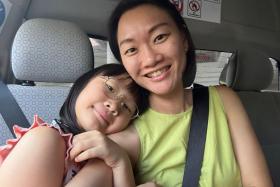She helps spot those with undiagnosed mental illness
They had mental health issues but now they use their experiences to help others with the same condition. LAKEISHA LEO (lwenqi@sph.com.sg) visited the S'pore Mental Health Conference 2016 yesterday and spoke to two women who trained under the Peer Specialist Training programme
She was only a 17-year-old junior college student when she was referred to the Institute of Mental Health (IMH).
She was later diagnosed with bipolar disorder.
Ms Ruth Komathi, now 26, remembers clearly when she started to feel depressed.
It was when she was 15, and her older brother - her only sibling - went abroad for his university studies. She missed him terribly and it started to affect her personality.
She said: "I went from being a chatty person to someone who was very withdrawn. I was crying almost every night, I got agitated over the smallest things. I couldn't control my emotions."
Ms Komathi recounted an incident where she even slapped her mother during an "episode".
"I couldn't control myself, I knew I was deliberately telling myself not to do it, but I did it anyway," she said.
She eventually dropped out of JC.
Her condition worsenedand when she was 17, a polyclinic doctor referred her to IMH.
At 18, she was transferred to the adult clinic at IMH, which diagnosed her with bipolar disorder.
The road to recovery was a long one. It took a while for her to accept herself and deal with the social stigma.
She said: "It was like falling into a pit and trying to crawl out over and over, with no success."
Her psychiatrist, Dr Joseph Leong, was a big help and through him, she joined the Peer Specialist Training programme conducted by the Singapore Association for Mental Health (SAMH) in 2013.
She said: "My psychiatrist saw that I had a desire to work with people, and he gave it to me like an extra activity to do."
EXAM
After the five-day long course. she had to take a written examination before she could become a peer specialist.
She also had to submit an interview form and sit for a face-to-face panel interview before she was allowed to join the programme.
Now in the mobile support team in SAMH as a peer specialist, she said: "I go on house visits with SAMH, where we speak to mostly undiagnosed clients and their caregivers to see if there's an issue."
Ms Komathi also has a degree in psychology from James Cook University Singapore
She said: "I did psychology because I always wanted to be in a profession that helps others.
"In the beginning, I wanted to understand myself better but now I realise that's where my heart is, to give back after I have received so much."
Illness made her isolate herself
She was arrested for trespassing in a nursing home in 2008.
Ms Chan Li Shan said: "I was lost. I was looking for a church so that I could become a nun and I walked into a nursing home by accident."
The staff ended up calling the police because "I think they really wanted to help me".
A day later, Ms Chan, who was then 25 and a philosophy student doing her master's at the National University of Singapore, was sent to the Institute of Mental Health (IMH).
She was diagnosed with schizophrenia.
The symptoms had started gradually and had been going on for months before the incident, said Ms Chan, who is now 33.
She said: "I didn't realise I had a mental illness because I've never encountered anyone with mental health issues before, so it was a subject unfamiliar to me.
"I started isolating myself. I even covered my window with a huge blanket and wore earplugs so that I wouldn't have to listen to anything."
TREATMENT
It was her mother who helped her, by getting her to seek treatment in April 2009.
She said: "My mother had secretly told a close friend of mineabout my condition, and asked if she could talk me into going for treatment. After a few months, this friend, who happened to be a trained counsellor, got me to agree."
Ms Chan received medication and psychotherapy, but laughter and support from family and loved ones also helped.
In 2013, she started helping others with the same condition under the Peers4Rs programme at IMH.
She said: "I wanted to use my experience for the benefit of others, and peer support gave me an opportunity to do that."
She was formally trained as a peer specialist in 2015 under the Peer Specialist Training programme.
Although Ms Chan is still on medication, she considers herself to have recovered to a certain extent. In 2012, she published a book titled A Philosopher's Madness,a personal account of her schizophrenia.
She is a manager in the mental health team at the National Council of Social Service.
She said: "The reason I'm in this team is because I want to use my experience for the benefit of others."
Helping loved ones with mental illness
The Singapore Mental Health Conference 2016 features international and local speakers, who will share their knowledge and experiences in supporting people with mental health issues across family, community and workplace settings.
Themed Mind Matters, Family Matters, the two-day conference started yesterday at the Singapore Expo.
It is jointly organised by the Institute of Mental Health (IMH), Agency for Integrated Care (AIC), National Council of Social Service (NCSS) and the Health Promotion Board (HPB).
Social and Family Development Minister Tan Chuan-Jin, who was the keynote speaker, saidyesterday that the conference is an important platform to share solutions about health and social support available for Singaporeans with mental care needs.
Get The New Paper on your phone with the free TNP app. Download from the Apple App Store or Google Play Store now



